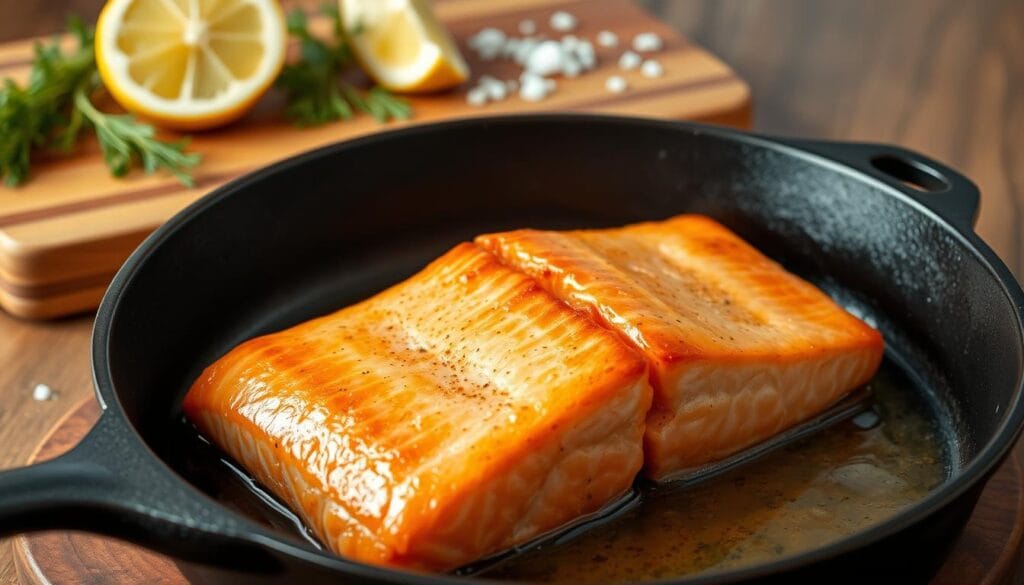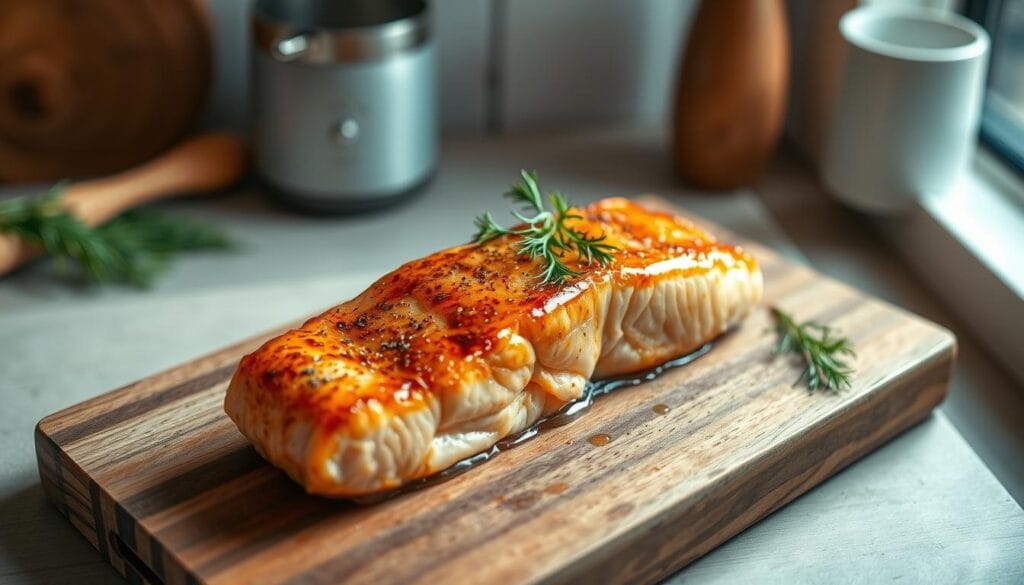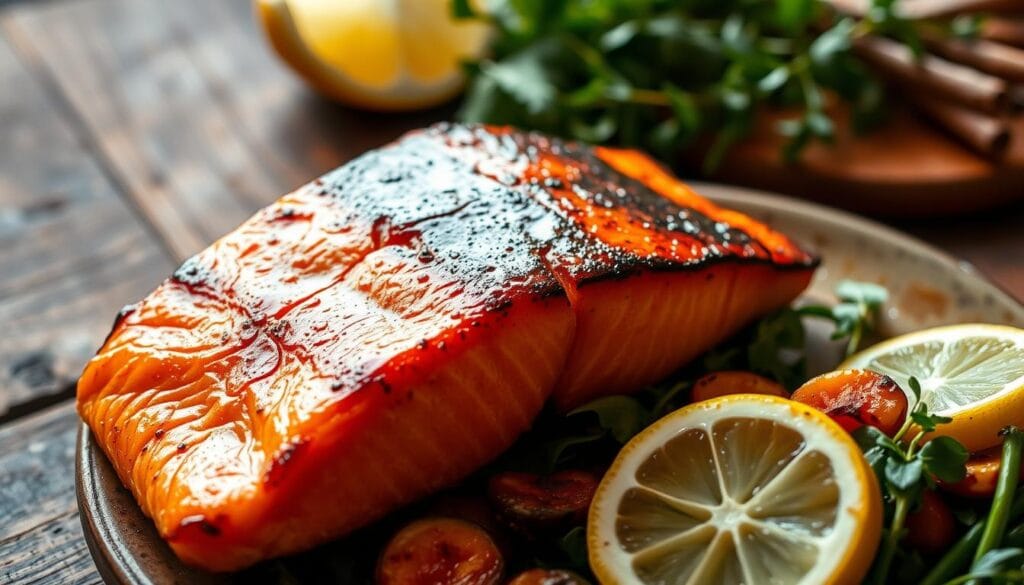Looking for a tasty and easy dinner? You’re in luck! Cooking sockeye salmon can spice up your meals.
A perfectly baked salmon fillet is a real showstopper. With just a few simple ingredients, you can make a dish that will wow everyone. In this article, we’ll guide you through a simple recipe to get you started.
Table of Contents
The Distinctive Qualities of Sockeye Salmon
Sockeye salmon is known for its bright color and great nutrition. It’s not just a pretty sight but also full of nutrients. These make it a healthy choice for any meal.
What Makes Sockeye Salmon Special
Sockeye salmon is lean and meaty, loved by chefs and home cooks. It’s rich in vitamins, fatty acids, and antioxidants. These nutrients offer many health benefits. When you make a sockeye salmon recipe, you add a lot of nutritional value to your diet.
Nutritional Profile of Sockeye Salmon
The nutritional profile of sockeye salmon is impressive. It’s packed with protein, omega-3 fatty acids, and vitamins and minerals. Here’s what you get in a 3-ounce serving:
| Nutrient | Amount |
|---|---|
| Protein | 20 grams |
| Omega-3 Fatty Acids | 1.5 grams |
| Vitamin D | 60% DV |
| Selenium | 45% DV |
Adding sockeye salmon to your diet with a
Health Benefits of Including Sockeye Salmon in Your Diet
Eating sockeye salmon can boost your health. It’s full of nutrients that help your body stay healthy and strong.
Omega-3 Fatty Acids and Heart Health
Sockeye salmon is rich in omega-3 fatty acids. These are good for your heart. They help lower bad fats and prevent blood clots. Eating foods like sockeye salmon can lower your heart disease risk.
Protein Content and Muscle Building
Sockeye salmon has a lot of protein. This is great for building and repairing muscles. It’s especially helpful when you exercise a lot. A diet with lots of protein can also help you stay at a healthy weight.
Vitamins and Minerals in Sockeye Salmon
Sockeye salmon also has vitamins and minerals like vitamin D and selenium. These are important for strong bones, a healthy immune system, and lots of energy.
| Nutrient | Amount per 3 oz serving | Health Benefit |
|---|---|---|
| Omega-3 Fatty Acids | 1.8 grams | Heart Health, Reduced Inflammation |
| Protein | 20 grams | Muscle Building, Weight Management |
| Vitamin D | 60% DV | Bone Health, Immune Function |
Adding sockeye salmon to your meals, like in a best sockeye salmon recipe, can make your diet better. It’s a tasty way to get more nutrients and support your health.
How to Select the Perfect Sockeye Salmon
Choosing the right Sockeye Salmon is crucial for a tasty dish. Whether it’s for a quick weeknight dinner or a big event, the salmon’s quality matters a lot.
Fresh or frozen salmon? Both have their perks. Fresh salmon is loved for its texture and taste. But frozen salmon, thanks to flash-freezing, can be just as tasty and nutritious.
Fresh vs. Frozen Sockeye Salmon
Fresh Sockeye Salmon looks vibrant and feels firm. But frozen Sockeye Salmon is easier to find and cheaper. Freezing keeps the fish’s flavors and nutrients safe.
| Characteristics | Fresh Sockeye Salmon | Frozen Sockeye Salmon |
|---|---|---|
| Texture | Firm | Can be softer after thawing |
| Flavor | Rich, vibrant | Preserved through freezing |
| Availability | Limited by season and location | Available year-round |
Signs of Quality Sockeye Salmon
Look for quality in both fresh and frozen salmon. Bright color, firm flesh, and a fresh smell are key. For frozen, check the packaging for damage or freezer burn.
Essential Tools and Ingredients for Sockeye Salmon Recipes
Before you start making sockeye salmon recipes, you need the right tools and ingredients. This will help you make a variety of tasty dishes easily.
Kitchen Equipment You’ll Need
To cook sockeye salmon well, you’ll need some key kitchen tools. You’ll need a sharp fillet knife, a cutting board, and a non-stick skillet or grill pan. A kitchen thermometer is also important to check the salmon’s internal temperature.
Basic Ingredients for Flavorful Salmon
For a simple yet tasty sockeye salmon recipe, you’ll need a few basic ingredients. You’ll need salmon fillet, olive oil, salt, and pepper. You can add more flavor with brown sugar, paprika, and lemon juice. Fresh herbs like parsley or dill can also make the dish better.
Preparing Your Sockeye Salmon Before Cooking
Getting your sockeye salmon ready is key for the best taste and texture. Before you start cooking, there are a few steps to take. This ensures your salmon is perfect.
Proper Thawing Techniques
If your sockeye salmon is frozen, thawing it right is important. You can thaw it in the fridge, in cold water, or in the microwave. The fridge method is safest, as it stops bacteria from growing.
After thawing, pat the salmon dry with paper towels. This removes extra moisture.
Removing Bones and Skin (if desired)
You might want to take out the bones and skin from your salmon. To remove bones, feel for them with your fingers and use tweezers to pull them out. For the skin, place the salmon skin-side down.
Make a small cut between the flesh and skin. Then, gently pry the flesh away from the skin.
Portioning Your Salmon
Dividing your salmon into portions makes cooking and serving simpler. Use a sharp knife to cut it into even pieces. For a healthy sockeye salmon recipe, cut it into 6-ounce portions.
This helps ensure all pieces cook evenly.
- Cut the salmon on a stable surface.
- Use a sharp knife to prevent tearing the fish.
- Portion sizes can be adjusted based on individual needs.
Classic Sockeye Salmon Recipe for Beginners

Cooking sockeye salmon is easy with our simple recipe. It’s great for beginners because it needs just a few ingredients and is straightforward to follow.
Simple Seasoning Approach
To make flavorful sockeye salmon, you’ll need:
- 4 sockeye salmon fillets (6 oz each)
- 2 tbsp olive oil
- 1 tsp salt
- 1 tsp black pepper
- 1 tsp lemon zest
- 2 lemons, sliced
Mix the olive oil, salt, black pepper, and lemon zest in a small bowl. Brush this mixture on both sides of the salmon fillets.
Step-by-Step Cooking Instructions
To cook your sockeye salmon, follow these steps:
- Preheat your oven to 400°F (200°C).
- Line a baking sheet with parchment paper or aluminum foil.
- Place the seasoned salmon fillets on the prepared baking sheet.
- Bake for 12-15 minutes or until the salmon is cooked through.
How to Tell When Your Salmon is Perfectly Cooked
The key to perfectly cooked salmon is checking its internal temperature. It should reach 145°F (63°C). You can also check by flaking it with a fork; if it flakes easily, it’s done. Avoid overcooking, as it can make the salmon dry.
| Cooking Method | Cooking Time | Internal Temperature |
|---|---|---|
| Baking | 12-15 minutes | 145°F (63°C) |
| Grilling | 4-6 minutes per side | 145°F (63°C) |
| Pan-searing | 3-4 minutes per side | 145°F (63°C) |
By following these simple steps, you’ll be able to prepare a delicious and healthy sockeye salmon dish that’s sure to impress.
Grilled Sockeye Salmon Recipe
Grilled sockeye salmon is a tasty and healthy dinner that’s quick to make. Sockeye salmon has a rich flavor and firm texture, perfect for grilling. To get the best results, make sure your grill and salmon are ready.
Preparing Your Grill for Salmon
First, heat your grill to medium-high. Clean the grates and brush them with oil to stop the salmon from sticking. For a gas grill, high heat helps get a nice char. For charcoal grills, spread the coals evenly.
Marinade Options for Grilled Sockeye
A marinade can really boost the flavor of your grilled sockeye salmon. Try a mix of gochujang paste, coconut aminos, honey, and garlic for a sweet and spicy taste. Or, a simple blend of olive oil, lemon juice, and herbs like thyme or rosemary can offer a light and refreshing flavor.
“The key to a great grilled salmon is not just the marinade, but also ensuring that the grill is hot and the fish is cooked just until it flakes easily with a fork.” – Chef’s Guide
Grilling Techniques and Timing
Put the salmon fillets on the grill, skin side down if they have skin. Close the lid and cook for 4-6 minutes per side, depending on the fillet’s thickness. It’s done when it flakes easily with a fork. Use a thermometer to check for an internal temperature of 145°F (63°C).
| Thickness | Grilling Time |
|---|---|
| 1 inch | 4-5 minutes per side |
| 1.5 inches | 6-7 minutes per side |
Baked Sockeye Salmon Recipe Variations
Enjoy the rich taste of sockeye salmon with these creative baked recipes. Baking is a healthy way to cook sockeye salmon. It lets you enhance its natural flavors and add your own twist.
Herb-Crusted Baked Salmon
Try an herb-crusted baked salmon for a tasty treat. Mix chopped parsley, dill, and thyme with breadcrumbs, garlic, and lemon juice. Coat the salmon with this mix and bake until it’s golden brown. This adds a crunchy texture and fresh flavors to your sockeye salmon.
Honey-Glazed Sockeye Salmon
A honey-glazed sockeye salmon is both sweet and savory. Whisk honey, soy sauce, and ginger for the glaze. Brush it on the salmon during the last baking minutes. This makes the outside caramelized and sticky, with a rich flavor.
Mediterranean-Style Baked Salmon
For a Mediterranean-style baked salmon, top the salmon with olives, artichoke hearts, sun-dried tomatoes, and feta cheese. Drizzle with olive oil and sprinkle oregano. This mix brings Mediterranean flavors to your dinner, with salty, tangy, and herbaceous notes.
These baked sockeye salmon recipe variations offer a variety of flavors and textures. Whether you prefer something classic or adventurous, there’s a recipe here for you.
- Try different seasoning combinations to find your favorite.
- Experiment with various glazes and marinades for added flavor.
- Pair your baked salmon with complementary side dishes for a well-rounded meal.
With these best sockeye salmon recipe variations, you’ll impress your family and friends. Enjoy a delicious and healthy meal. Happy cooking!
Pan-Seared Sockeye Salmon Recipe

Getting a perfectly cooked sockeye salmon fillet is simple with pan-searing. This method gives you a crispy skin and a soft inside. It’s a top choice for seafood lovers.
Achieving the Perfect Crispy Skin
To get crispy skin, start by drying the salmon with paper towels. Season it with salt and pepper. Heat a skillet over medium-high, add a bit of oil, and sear the salmon skin-side down.
Cook for about 4 minutes until the skin is crispy. Then, flip it and cook for another 3-4 minutes.
Pan Sauce Recommendations
Make your pan-seared sockeye salmon even better with a tasty pan sauce. Mix gochujang paste, coconut aminos, honey, and garlic for a sweet and spicy glaze. Sauté these ingredients in the same pan after cooking the salmon.
Scrape up any browned bits for extra flavor.
Serving Suggestions
Serve your pan-seared sockeye salmon with steamed veggies or a fresh salad. For a fuller meal, try it with quinoa or roasted potatoes. Sockeye salmon goes well with many sides, so try different ones.
Delicious Side Dishes to Complement Your Sockeye Salmon
To make a complete meal, pick side dishes that match the sockeye salmon’s rich taste. A healthy sockeye salmon recipe needs sides that are both nutritious and delicious.
Vegetable Pairings
Vegetables go well with sockeye salmon. Try sautéed asparagus or green beans to enhance the fish’s taste. Roasted veggies like Brussels sprouts or carrots add a nice texture contrast.
Grain and Starch Options
Grains and starches make your meal filling. Serve sockeye salmon with rice, quinoa, or cauliflower rice for a low-carb choice. These options balance the meal and soak up the salmon’s juices.
Sauce and Condiment Ideas
Make your sockeye salmon even better with sauces and condiments. A lemon-dill sauce or fresh lemon juice can brighten it. For a spicy twist, try spicy aioli or hot sauce.
| Side Dish | Description | Pairing Tip |
|---|---|---|
| Sautéed Asparagus | Quick-cooked with garlic and lemon | Complements salmon’s rich flavor |
| Quinoa | Nutritious and filling grain | Pairs well with herb-crusted salmon |
| Lemon-Dill Sauce | Bright and refreshing sauce | Adds a nice contrast to grilled salmon |
Storing and Repurposing Leftover Sockeye Salmon
Don’t let leftover sockeye salmon go to waste. There are many ways to store and reuse it. Whether you made a simple sockeye salmon recipe or something more complex, leftovers can be delicious with the right approach.
Proper Storage Methods
To keep your leftover sockeye salmon fresh, store it in an airtight container in the fridge within two hours of cooking. It can stay good for up to three days. If you won’t use it in three days, freeze it. Frozen sockeye salmon can last up to three months.
When you’re ready to use it, thaw the salmon in the fridge overnight. Or thaw it quickly by putting the container in cold water.
Creative Leftover Recipe Ideas
Leftover sockeye salmon is very versatile. You can flake it and add it to salads, pasta, or as a topping for bagels or crackers. Try making salmon cakes by mixing the leftover fish with breadcrumbs, egg, and seasonings, then pan-frying until crispy.
You can also use it in sushi rolls or as a filling for omelets.
For a quick and easy sockeye salmon recipe, make a salmon salad. Mix the leftover fish with diced veggies like onions, carrots, and celery, and a tangy dressing.
Food Safety Considerations
When handling leftover sockeye salmon, follow food safety guidelines. Always check the salmon for any signs of spoilage before eating it, like an off smell or slimy texture. Reheat cooked salmon to 145°F (63°C) to ensure it’s safe.
If you’re unsure, it’s best to throw out the leftovers.
Conclusion: Enjoying Your Homemade Sockeye Salmon
Now that you’ve mastered the simple sockeye salmon recipe, it’s time to savor the delicious results. Whether you’ve chosen to grill, bake, or pan-sear your sockeye salmon, the key to a memorable meal lies in the quality of the ingredients and the care taken during preparation.
As you enjoy your homemade sockeye salmon, consider experimenting with different seasonings and side dishes to find your perfect combination. The versatility of sockeye salmon makes it an ideal canvas for a variety of flavors, from the brightness of lemon and herbs to the richness of a well-crafted pan sauce.
Sharing your experiences and creations with friends and family can add a new dimension to your culinary adventures. So, go ahead and give the simple sockeye salmon recipe a try, and discover the joy of cooking this nutritious and flavorful fish.

